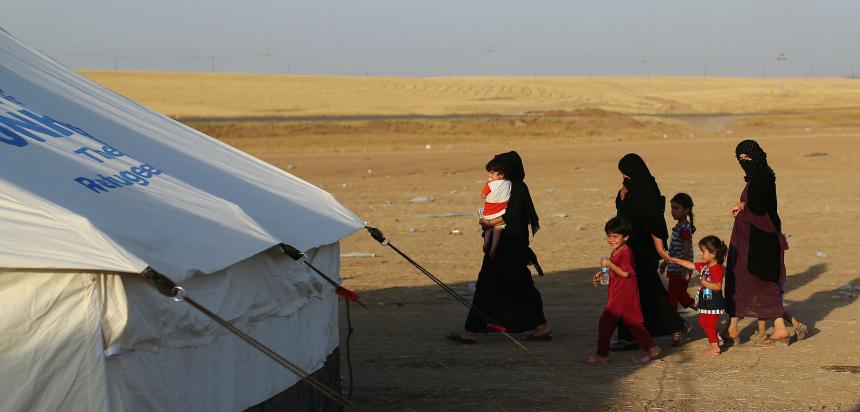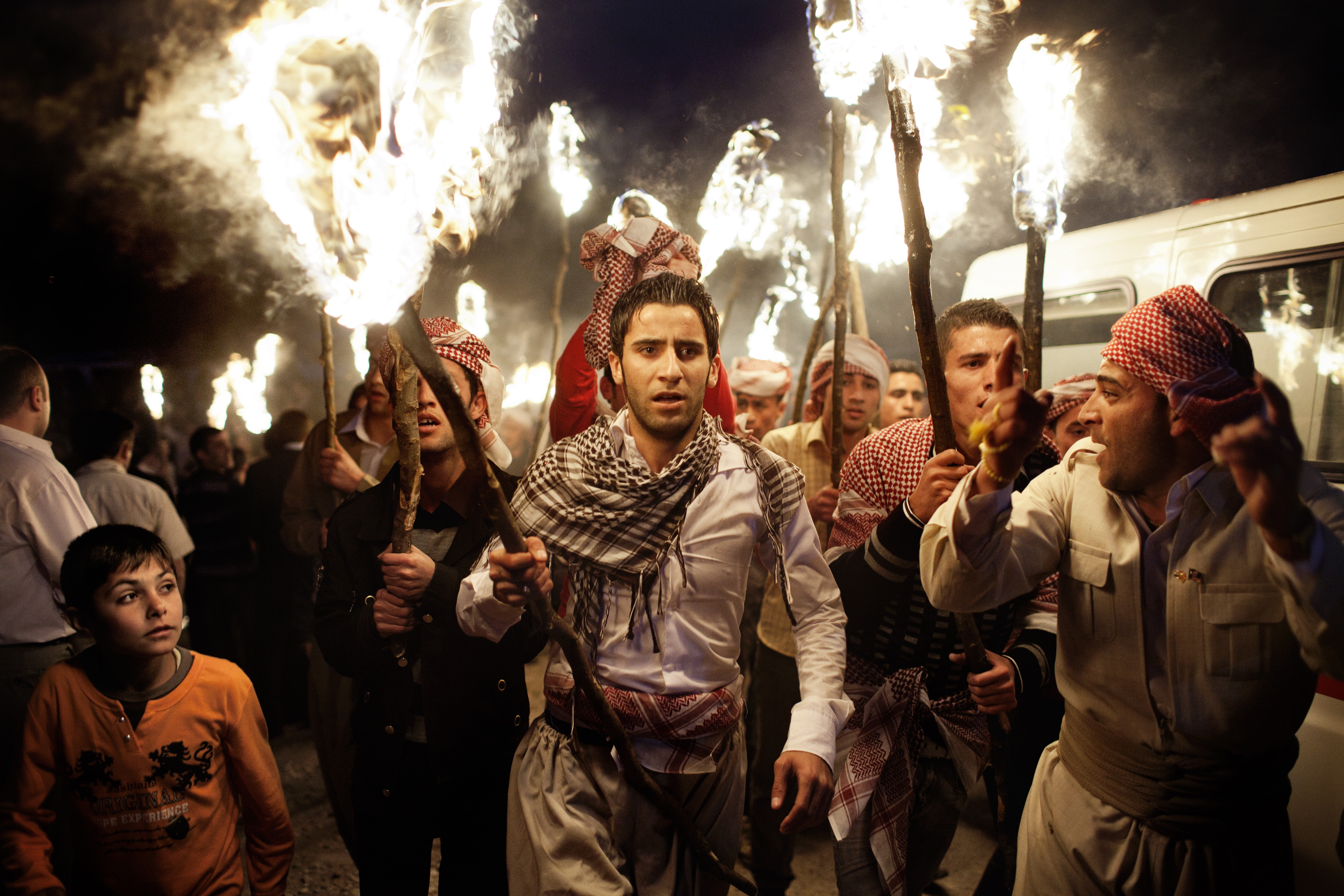
On June 17, late at night, a man wandered between the neat rows of newly erected tents at the Khazer refugee camp, startling the Kurdish photographer Ali Arkady awake. After a long day among the displaced, a few hundred Iraqis who had fled Mosul after it was taken over by the Islamic State of Iraq and al-Sham (ISIS), Arkady had fallen asleep near where two local aid workers sat eating a late dinner. He watched as the aid workers shined their dim cell phone lights onto the man's face, who looked "shocked," Arkady later told me, like he had been caught.
Single men who claimed to be displaced were not being allowed into Iraqi Kurdistan -- at least not without going through a lengthy process, including securing a local guarantor, to prove they were harmless. The man must have known that he would not have been offered refuge at Khazer, and so Arkady and the aid workers assumed he didn't plan on staying long. "That's why we thought he was from ISIS," Arkady told me.
Arkady and the aid workers immediately suspected he had come to kidnap the Iraqi soldiers at this camp set up in Iraq's autonomous Kurdish north, which had become a makeshift home for Iraqis fleeing the fighting just south of the Kurdish border. ISIS's propaganda has lately centered on chilling photos and video of government soldiers who had either already been executed by the jihadists or were on the way to their death.
The Iraqis who have walked or driven through the Kurdish Peshmerga's checkpoints to reach the Khazer refugee camp have divergent accounts of the extremist group that uprooted them. Nazir Mohammed, a 46-year-old father of three, told me he was more worried about the retaliatory shelling by Prime Minister Nouri al-Maliki's troops than ISIS. So he hauled his family north: His young kids screamed in the car, tired from the heat, while Mohammed secured a small cage of birds to the roof, covering it gently with a blanket.
It was impossible to tell whether Mohammed's account was genuine or professed out of the kind of intense fear that can tail a person into safety. "[ISIS doesn't] interfere in people's lives," he said. "They tell us not to be afraid. Of course, we know it would be different if we were Shiite."
That shocked but sanguine -- and sometimes supportive or even grateful -- assessment of ISIS has been echoed throughout the camp as the community grows. Some observers and journalists see it as evidence that the extremist group was aided by local Sunni leaders, who had personal connections to the internally displaced people. Others read that politically savvy Baathists, dormant since the fall of Saddam Hussein, had helped ISIS win hearts and minds.
Whatever the implication in Mohammed's account, ISIS in Iraq was revealing itself to be a much more diverse organization than previously portrayed. "ISIS is just the cover," Hemin Hawrami, the head of foreign relations for the Kurdistan Democratic Party told me. "They don't have more than 2,000 fighters. Is it possible for 2,000 fighters to get control of a vast area.... [The territory ISIS has captured] is bigger than all of Iraqi Kurdistan!"
From Kurdistan, where most journalists have watched the crisis unfold, it was impossible to know exactly how ISIS was operating and who had the control within the group. Video footage played during television news segments tended to be plucked from the ISIS YouTube account, while a great number of photographs were likewise sourced from the extremist group's large and apparently deft online presence. The group was sweeping through Iraq, gathering, it seemed, local Sunni leaders along with remnants of Saddam Hussein's regime as they went. It was raising its black flag over Iraqi cities and towns, forcing locals like Mohammed from their homes, and doing so by aggressively perpetuating its reputation for brutality. It had money and weapons. It had the support of many Sunnis who considered it the beginning of a revolution, however harsh, against the Maliki government.
As the days went by, reports from internally displaced people and journalists circulated that ISIS began to crack down on the areas it had seized, enforcing its medieval version of Islamic law. "The euphoria of the first few days, about ISIS kicking out Maliki, is about to dissipate," Hiwa Osman, a Kurdish political commentator in Erbil, told me. As the group began enforcing sharia law, Osman anticipated that the locals would begin to recognize the supposed revolutionaries as terrorists.
Osman was himself trying to put together the ISIS puzzle. "ISIS is posting on Facebook and on social media," he told me. "They are doing an efficient job with that, putting up the right pictures to scare people off. The Baathist are providing guidance and help to ISIS to win small but yet spectacular battles in various areas, and then have it reported and put on Facebook. The tribes are bringing the popular support."
Closer to the fighting, the assessment was less clear. By June 20, the city of Kirkuk -- which had been captured and sealed off by Kurdish Peshmerga after Iraqi soldiers abandoned their posts and ISIS tried to march through -- was a ghost town. The oil-rich territory is claimed by Kurds, Arabs, and Turkmen, and is accustomed to being the center of disputes. A local gold merchant and his family -- his wife, one young daughter, two grown sons, and his mother -- had not left their house since ISIS took the town of Hawija, just south of Kirkuk. "We heard that ISIS has no problem with the Kurds," the father told me, clasping his hands on his lap. He seemed to take little solace in this belief.
"ISIS has Afghans, Syrians, Europeans, all of them. And Saudi Arabia supports them," the father told me."Nobody knows what they want. They say they want Iraq to be Islamic, but they are not real Muslims."
Nearby, in the stifling dormitory of a local college, six Hawija natives lay on foam mattresses in front of a wheezing air cooler, listening to music on a cordless radio. Their clothes were damp with sweat. One defended ISIS. Last year, the Iraqi Army brutally cracked down on an anti-government protest in Hawija, killing dozens. ISIS, among other things, is the manifestation of the townspeople's fury in the wake of the massacre.
Another was vague. "What is ISIS?" he said, tracing a question mark in the air with his forefinger. Four others remained quietly standing near the wall. "I know more about ISIS, but I can't tell," the second boy said. His family had fled to nearby Sulaymaniyah, and he didn't have enough money to visit them. "ISIS is the civilians," he said. "ISIS is not ISIS."
Even Kirkuk journalists struggled to understand the jihadist group. Haji Kirkuky has covered conflict for local newspapers in his native Kirkuk for decades, but he was unwilling to venture too close to the extremists a mere 30 minutes' drive from his office. Instead, he relied on phone calls from friends in Hawija for information. But they were aware of the consequences of their testimony.
"I ask my friends, 'Why aren't you telling the media what you need?'" Kirkuky said. "They are afraid. ISIS has made rules. They have set up checkpoints."
Kirkuky gave the impression of Hawija as one big hostage-taking. "They hate women. They don't want a civilian court," he continued, relating to me what his friends had told him over the phone. "Sunni groups made an agreement, not only in Mosul," he paused. "The story is much bigger than this."
On June 17, after the unidentified man had fled Khazer refugee camp into the night, Arkady and the aid workers were shaken by the incident. The Iraqi soldiers were like flares in the camp, drawing attention to the families huddled among them. They seemed to occupy the most wretched position in the conflict -- beholden to a corrupt government, mocked as deserters, hunted by extremists. In their lowest moment, comatose in the camp's dense heat, the Iraqi soldiers were straightforward about their experience with ISIS, who many had seen up close.
"One of the soldiers told me he wanted to kill himself," Arkady said. "That it would be better than this situation."







